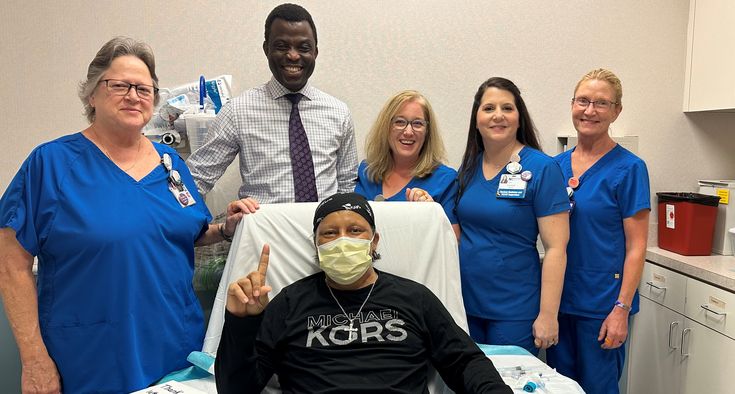Tony Williamson was 57 when a lifetime of working construction caught up with him.
He had battled back pain for years. But things took a turn one day, when Williamson stood up from praying and fell. The accident required thigh bone surgery, and the operation revealed a huge, unexpected discovery: Williamson had stage 4 prostate cancer, and it had spread to his bones.
“They gave me six months to live,” he remembered. “I said, ‘Ain’t no way! I’ve got too much to do.’”
That was four years ago. Williamson, a father of three, had just finished remodeling a home and had big plans for the family construction business. But his back pain had become excruciating. It sapped him of the strength to get through the day, let alone fix up another house.
Advanced treatment to attack your prostate cancer
A new hope for specific prostate cancer patients
Prostate cancer is the most common cancer among men, with Black men at a higher risk of developing and dying from it, according to the Centers for Disease Control and Prevention.
Top scores for safety in NC
Novant Health received the most ‘As’ for patient safety in North Carolina from The Leapfrog Group. With a focus on safety, quality and patient experience, the national, industry-leading nonprofit, evaluates and assigns letter grades ranging from A to F to hospitals across the country. Novant Health’s hospitals with “A” grades outperform 70% of hospitals nationwide for safety and quality.
Some are candidates for a prostatectomy, an operation that removes the prostate but can also cause erectile dysfunction and urinary incontinence. Because Williamson’s cancer had spread beyond the prostate, it was too late for surgery.
The spread also prevented the effectiveness of radiation known as external beam radiation therapy. Hormone therapy can eliminate cancer cells by starving them of testosterone, but the effect was temporary in Williamson’s case. He exhausted these options as well as chemotherapy, which caused him to lose his hair and a lot of weight.
But in 2022, a new option emerged. Pluvicto, a medication that can slow the spread of prostate cancer, was approved by the Food and Drug Administration. When enough doses became available in 2023, oncologist Dr. Tim Collins of Novant Health Cancer Institute - Forsyth Medical Center identified Williamson as a candidate. To be eligible, patients must have undergone chemo specifically for prostate-specific membrane antigen (PSMA)-positive metastatic castration-resistant prostate cancer, as Williamson had.
And Williamson would be Novant Health’s first Pluvicto patient. As Collins explained to him, Pluvicto does not cure cancer. But by slowing its spread, the drug offered a quality of life that nothing else could.

“Pluvicto is now an option for people who have failed other standard therapies,” Collins said. “For somebody who has been through all those treatments, this represents an entirely new type of treatment.”
Williamson was willing to try anything to ease the agony.
A team approach to treatment
Pluvicto is a radiopharmaceutical drug administered intravenously in six doses, six weeks apart. It releases radiation to kill local and metastatic prostate cancer cells.
The new theranostic program at Novant Health Forsyth Medical Center in Winston-Salem offers a team approach to Pluvicto treatment. Collins and other oncologists refer eligible patients to nuclear medicine physician Dr. Gbenga Shogbesan, who last year joined the staff as medical director of molecular imaging and theranostics.
Theranostics is the process of injecting radiation-producing agents to treat cancer. Shogbesan interprets PET-CT scans for PSMA to assess the spread of disease and determine if the patient will benefit from treatment with Pluvicto. Oncologists use blood tests to check prostate-specific antigen (PSA) levels and determine whether cancer cells are growing.
Williamson remembers Shogbesan immediately putting him at ease. They connected over a mutual faith in God and prayed together before that first treatment in October 2023.
“The next day I literally sat up in bed, got up and walked to the bathroom,” Williamson said. “After the first dose I couldn’t believe it. I was still hurting some, but I was able to fight through the pain and walk.”
Pluvicto’s side effects include fatigue, dry mouth, low blood count, impaired kidney function, diarrhea and vomiting. Williamson has reported feeling tired, though his pain has eased, and his PSA levels have improved with each dose, Shogbesan said.

“When Tony came back in November, he was a different man,” said Shogbesan. “He was in high spirits, and that has been the reaction of most of our patients.”
Eligible patients should expect a 90-minute visit per dose, an appointment that includes instructions related to radiation protection. Pluvicto is administered with an IV and takes only a few minutes.
Williamson, now 61, says he’s grateful that the drug came into his life at the right time.
“I have hope in this medicine,” he said. “It has really changed me. Most of my pain is gone.”
Pluvicto primer
What is it?
Pluvicto is a six-dose therapy treatment approved for men with PSMA-positive mCRPC (metastatic castration-resistant prostate cancer) who have been treated with hormone therapy and chemotherapy. The first dose is ready within two weeks of prescription.
Who makes it?
Novartis manufactures the drug in Indianapolis; Millburn, New Jersey; Italy; and Spain.












